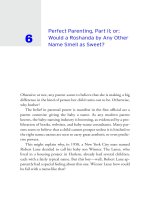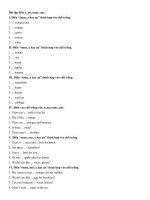Would a Roshanda by Any Other name smell as sweet
Bạn đang xem bản rút gọn của tài liệu. Xem và tải ngay bản đầy đủ của tài liệu tại đây (1.28 MB, 26 trang )
6
Perfect Parenting, Part II; or:
Would a Roshanda by Any Other
Name Smell as Sweet?
Obsessive or not, any parent wants to believe that she is making a big
difference in the kind of person her child turns out to be. Otherwise,
why bother?
The belief in parental power is manifest in the first official act a
parent commits: giving the baby a name. As any modern parent
knows, the baby-naming industry is booming, as evidenced by a pro-
liferation of books, websites, and baby-name consultants. Many par-
ents seem to believe that a child cannot prosper unless it is hitched to
the right name; names are seen to carry great aesthetic or even predic-
tive powers.
This might explain why, in 1958, a New York City man named
Robert Lane decided to call his baby son Winner. The Lanes, who
lived in a housing project in Harlem, already had several children,
each with a fairly typical name. But this boy—well, Robert Lane ap-
parently had a special feeling about this one. Winner Lane: how could
he fail with a name like that?
FREAKONOMICS
Three years later, the Lanes had another baby boy, their seventh and
last child. For reasons that no one can quite pin down today, Robert de-
cided to name this boy Loser. It doesn’t appear that Robert was un-
happy about the new baby; he just seemed to get a kick out of the
name’s bookend effect. First a Winner, now a Loser. But if Winner Lane
could hardly be expected to fail, could Loser Lane possibly succeed?
Loser Lane did in fact succeed. He went to prep school on a schol-
arship, graduated from Lafayette College in Pennsylvania, and joined
the New York Police Department (this was his mother’s longtime
wish), where he made detective and, eventually, sergeant. Although
he never hid his name, many people were uncomfortable using it. “So
I have a bunch of names,” he says today, “from Jimmy to James to
whatever they want to call you. Timmy. But they rarely call you
Loser.” Once in a while, he said, “they throw a French twist on it:
‘Losier.’ ” To his police colleagues, he is known as Lou.
And what of his brother with the can’t-miss name? The most note-
worthy achievement of Winner Lane, now in his midforties, is the
sheer length of his criminal record: nearly three dozen arrests for
burglary, domestic violence, trespassing, resisting arrest, and other
mayhem.
These days, Loser and Winner barely speak. The father who
named them is no longer alive. Clearly he had the right idea—that
naming is destiny—but he must have gotten the boys mixed up.
Then there is the recent case of Temptress, a fifteen-year-old girl
whose misdeeds landed her in Albany County Family Court in New
York. The judge, W. Dennis Duggan, had long taken note of the
strange names borne by some offenders. One teenage boy, Amcher,
had been named for the first thing his parents saw upon reaching the
hospital: the sign for Albany Medical Center Hospital Emergency
Room. But Duggan considered Temptress the most outrageous name
he had come across.
164
A Roshanda by Any Other Name
“I sent her out of the courtroom so I could talk to her mother
about why she named her daughter Temptress,” the judge later re-
called. “She said she was watching The Cosby Show and liked the
young actress. I told her the actress’s name was actually Tempestt Bled-
soe. She said she found that out later, that they had misspelled the
name. I asked her if she knew what ‘temptress’ meant, and she said she
also found that out at some later point. Her daughter was charged
with ungovernable behavior, which included bringing men into the
home while the mother was at work. I asked the mother if she had
ever thought the daughter was living out her name. Most all of this
went completely over her head.”
Was Temptress actually “living out her name,” as Judge Duggan
saw it? Or would she have wound up in trouble even if her mother
had called her Chastity? *
It isn’t much of a stretch to assume that Temptress didn’t have ideal
parents. Not only was her mother willing to name her Temptress in
the first place, but she wasn’t smart enough to know what that word
even meant. Nor is it so surprising, on some level, that a boy named
Amcher would end up in family court. People who can’t be bothered
to come up with a name for their child aren’t likely to be the best par-
ents either.
So does the name you give your child affect his life? Or is it your life
reflected in his name? In either case, what kind of signal does a child’s
name send to the world—and most important, does it really matter?
As it happens, Loser and Winner, Temptress and Amcher were all
black. Is this fact merely a curiosity or does it have something larger to
say about names and culture?
* See footnote, p. 304.
165
FREAKONOMICS
Every generation seems to produce a few marquee academics who
advance the thinking on black culture. Roland G. Fryer Jr., the young
black economist who analyzed the “acting white” phenomenon and
the black-white test score gap, may be among the next. His ascension
has been unlikely. An indifferent high-school student from an unsta-
ble family, he went to the University of Texas at Arlington on an
athletic scholarship. Two things happened to him during college: he
quickly realized he would never make the NFL or the NBA; and, tak-
ing his studies seriously for the first time in his life, he found he
liked them. After graduate work at Penn State and the University of
Chicago, he was hired as a Harvard professor at age twenty-five. His
reputation for candid thinking on race was already well established.
Fryer’s mission is the study of black underachievement. “One
could rattle off all the statistics about blacks not doing so well,” he
says. “You can look at the black-white differential in out-of-wedlock
births or infant mortality or life expectancy. Blacks are the worst-
performing ethnic group on SATs. Blacks earn less than whites. They
are still just not doing well, period. I basically want to figure out
where blacks went wrong, and I want to devote my life to this.”
In addition to economic and social disparity between blacks and
whites, Fryer had become intrigued by the virtual segregation of cul-
ture. Blacks and whites watch different television shows. (Monday
Night Football is the only show that typically appears on each group’s
top ten list; Seinfeld, one of the most popular sitcoms in history, never
ranked in the top fifty among blacks.) They smoke different ciga-
rettes. (Newports enjoy a 75 percent market share among black teen-
agers versus 12 percent among whites; the white teenagers are mainly
smoking Marlboros.) And black parents give their children names
that are starkly different from white children’s.
Fryer came to wonder: is distinctive black culture a cause of the
economic disparity between blacks and whites or merely a reflection
of it?
166
A Roshanda by Any Other Name
As with the ECLS study, Fryer went looking for the answer in a
mountain of data: birth-certificate information for every child born
in California since 1961. The data, covering more than sixteen mil-
lion births, included standard items such as name, gender, race, birth-
weight, and the parents’ marital status, as well as more telling factors
about the parents: their zip code (which indicates socioeconomic sta-
tus and a neighborhood’s racial composition), their means of paying
the hospital bill (again, an economic indicator), and their level of ed-
ucation.
The California data prove just how dissimilarly black and white
parents name their children. White and Asian-American parents,
meanwhile, give their children remarkably similar names; there is
some disparity between white and Hispanic-American parents, but it
is slim compared to the black-white naming gap.
The data also show the black-white gap to be a recent phenome-
non. Until the early 1970s, there was a great overlap between black
and white names. The typical baby girl born in a black neighborhood
in 1970 was given a name that was twice as common among blacks
than whites. By 1980 she received a name that was twenty times more
common among blacks. (Boys’ names moved in the same direction
but less aggressively—probably because parents of all races are less ad-
venturous with boys’ names than with girls’.) Given the location and
timing of this change—dense urban areas where Afro-American ac-
tivism was gathering strength—the most likely cause of the explosion
in distinctively black names was the Black Power movement, which
sought to accentuate African culture and fight claims of black inferi-
ority. If this naming revolution was indeed inspired by Black Power, it
would be one of the movement’s most enduring remnants. Afros
today are rare, dashikis even rarer; Black Panther founder Bobby Seale
is best known today for peddling a line of barbecue products.
A great many black names today are unique to blacks. More than
40 percent of the black girls born in California in a given year receive
167
FREAK ONOMIC S
a name that not one of the roughly 100,000 baby white girls received
that year. Even more remarkably, nearly 30 percent of the black girls
are given a name that is unique among the names of every baby,
white and black, born that year in California. (There were also 228
babies named Unique during the 1990s alone, and 1 each of Uneek,
Uneque, and Uneqqee.) Even among very popular black names, there
is little overlap with whites. Of the 626 baby girls named Deja in the
1990s, 591 were black. Of the 454 girls named Precious, 431 were
black. Of the 318 Shanices, 310 were black.
What kind of parent is most likely to give a child such a distinc-
tively black name? The data offer a clear answer: an unmarried, low-
income, undereducated teenage mother from a black neighborhood
who has a distinctively black name herself. In Fryer’s view, giving a
child a superblack name is a black parent’s signal of solidarity with the
community. “If I start naming my kid Madison,” he says, “you might
think, ‘Oh, you want to go live across the railroad tracks, don’t you?’ ”
If black kids who study calculus and ballet are thought to be “acting
white,” Fryer says, then mothers who call their babies Shanice are
simply “acting black.”
The California study shows that many white parents send as
strong a signal in the opposite direction. More than 40 percent of the
white babies are given names that are at least four times more com-
mon among whites. Consider Connor and Cody, Emily and Abigail.
In one recent ten-year stretch, each of these names was given to at
least two thousand babies in California—fewer than 2 percent of
them black.
So what are the “whitest” names and the “blackest” names?
The Twenty “Whitest” Girl Names
1. Molly 3. Claire
2. Amy 4. Emily
168
A R o shanda b y An y Other Name
5. Katie 13. Katherine
6. Madeline 14. Caitlin
7. Katelyn 15. Kaitlin
8. Emma 16. Holly
9. Abigail 17. Allison
10. Carly 18. Kaitlyn
11. Jenna 19. Hannah
12. Heather 20. Kathryn
The Twenty “Blackest” Girl Names
1. Imani 11. Jada
2. Ebony 12. Tierra
3. Shanice 13. Tiara
4. Aaliyah 14. Kiara
5. Precious 15. Jazmine
6. Nia 16. Jasmin
7. Deja 17. Jazmin
8. Diamond 18. Jasmine
9. Asia 19. Alexus
10. Aliyah 20. Raven
The Twenty “Whitest” Boy Names
1. Jake 9. Scott
2. Connor 10. Logan
3. Tanner 11. Cole
4. Wyatt 12. Lucas
5. Cody 13. Bradley
6. Dustin 14. Jacob
7. Luke 15. Garrett
8. Jack 16. Dylan
169
FREAK ONOMIC S
17. Maxwell 19. Brett
18. Hunter 20. Colin
The Twenty “Blackest” Boy Names
1. DeShawn 11. Demetrius
2. DeAndre 12. Reginald
3. Marquis 13. Jamal
4. Darnell 14. Maurice
5. Terrell 15. Jalen
6. Malik 16. Darius
7. Trevon 17. Xavier
8. Tyrone 18. Terrance
9. Willie 19. Andre
10. Dominique 20. Darryl
So how does it matter if you have a very white name or a very black
name? Over the years, a series of “audit studies” have tried to measure
how people perceive different names. In a typical audit study, a re-
searcher would send two identical (and fake) résumés, one with a
traditionally white name and the other with an immigrant or
minority-sounding name, to potential employers. The “white” ré-
sumés have always gleaned more job interviews.
According to such a study, if DeShawn Williams and Jake
Williams sent identical résumés to the same employer, Jake Williams
would be more likely to get a callback. The implication is that black-
sounding names carry an economic penalty. Such studies are tantaliz-
ing but severely limited, for they can’t explain why DeShawn didn’t
get the call. Was he rejected because the employer is a racist and is
convinced that DeShawn Williams is black? Or did he reject him be-
cause “DeShawn” sounds like someone from a low-income, low-
170
A Roshanda by Any Other Name
education family? A résumé is a fairly undependable set of clues—a
recent study showed that more than 50 percent of them contain
lies—so “DeShawn” may simply signal a disadvantaged background
to an employer who believes that workers from such backgrounds are
undependable.
Nor do the black-white audit studies predict what might have hap-
pened in a job interview. What if the employer is racist, and if he un-
wittingly agreed to interview a black person who happened to have a
white-sounding name—would he be any more likely to hire the black
applicant after meeting face-to-face? Or is the interview a painful and
discouraging waste of time for the black applicant—that is, an eco-
nomic penalty for having a white-sounding name? Along those same
lines, perhaps a black person with a white name pays an economic
penalty in the black community; and what of the potential advantage
to be gained in the black community by having a distinctively black
name? But because the audit studies can’t measure the actual life out-
comes of the fictitious DeShawn Williams versus Jake Williams, they
can’t assess the broader impact of a distinctively black name.
Maybe DeShawn should just change his name.
People do this all the time, of course. The clerks in New York City’s
civil court recently reported that name changes are at an all-time high.
Some of the changes are purely, if bizarrely, aesthetic. A young couple
named Natalie Jeremijenko and Dalton Conley recently renamed
their four-year-old son Yo Xing Heyno Augustus Eisner Alexander
Weiser Knuckles Jeremijenko-Conley. Some people change names
for economic purposes: after a New York livery-cab driver named
Michael Goldberg was shot in early 2004, it was reported that Mr.
Goldberg was in fact an Indian-born Sikh who thought it advanta-
geous to take a Jewish name upon immigrating to New York. Gold-
berg’s decision might have puzzled some people in show business
circles, where it is a time-honored tradition to change Jewish names.
171
FREAKONOMICS
Thus did Issur Danielovitch become Kirk Douglas; thus did the
William Morris Agency rise to prominence under its namesake, the
former Zelman Moses.
The question is, would Zelman Moses have done as well had he
not become William Morris? And would DeShawn Williams do any
better if he called himself Jake Williams or Connor Williams? It is
tempting to think so—just as it is tempting to think that a truckload
of children’s books will make a child smarter.
Though the audit studies can’t be used to truly measure how much
a name matters, the California names data can.
How? The California data included not only each baby’s vital sta-
tistics but information about the mother’s level of education, income,
and, most significantly, her own date of birth. This last fact made it
possible to identify the hundreds of thousands of California mothers
who had themselves been born in California and then to link them to
their own birth records. Now a new and extremely potent story
emerged from the data: it was possible to track the life outcome of any
individual woman. This is the sort of data chain that researchers
dream about, making it possible to identify a set of children who were
born under similar circumstances, then locate them again twenty or
thirty years later to see how they turned out. Among the hundreds of
thousands of such women in the California data, many bore distinc-
tively black names and many others did not. Using regression analysis
to control for other factors that might influence life trajectories, it was
then possible to measure the impact of a single factor—in this case, a
woman’s first name—on her educational, income, and health out-
comes.
So does a name matter?
The data show that, on average, a person with a distinctively
black name—whether it is a woman named Imani or a man named
DeShawn—does have a worse life outcome than a woman named
172





![financial simulation modeling in excel [electronic resource] a step-by-step guide](https://media.store123doc.com/images/document/14/y/vn/medium_vng1401470765.jpg)



